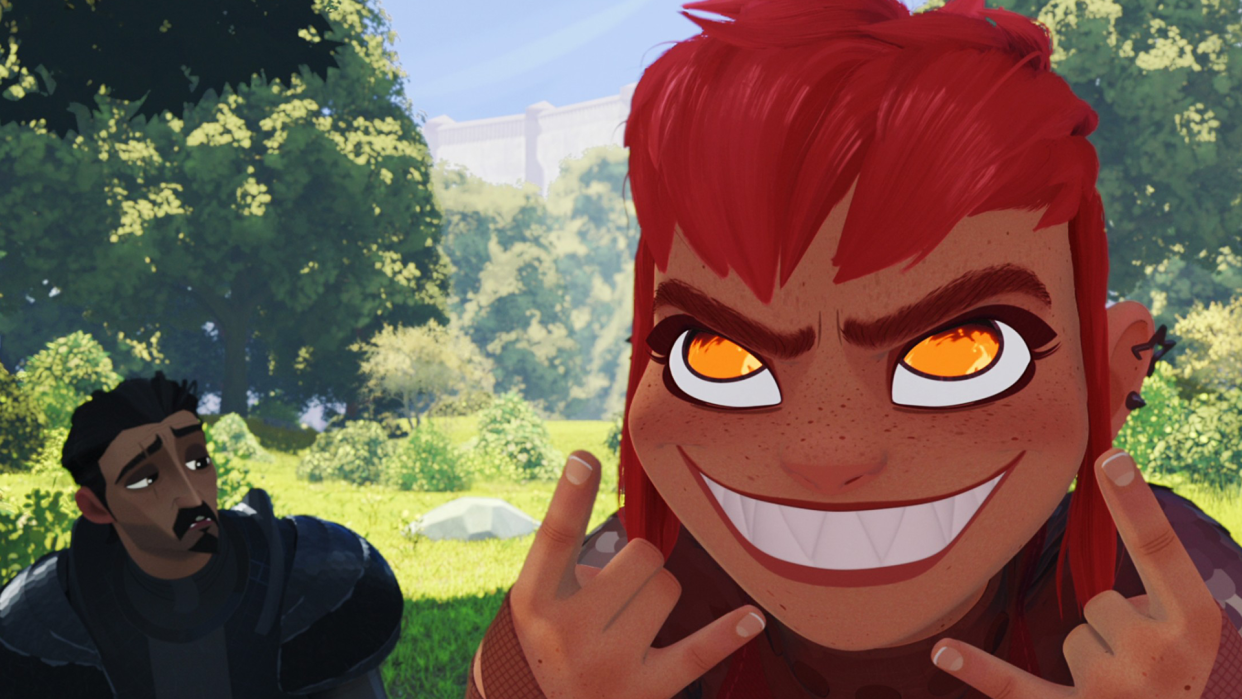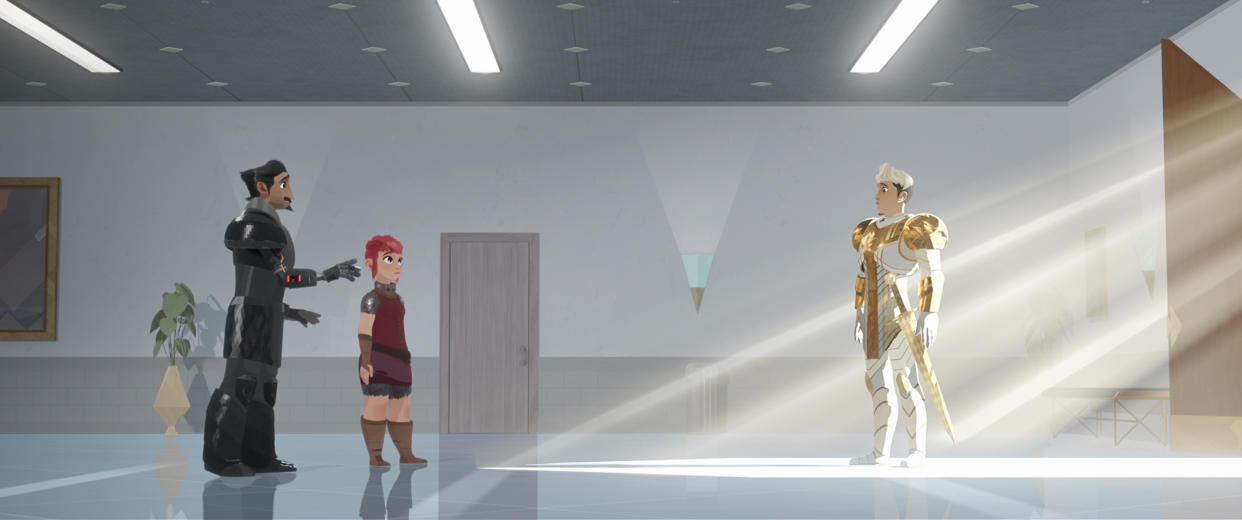'Nimona' star Chloë Grace Moretz on playing a gender non-conforming hero: 'It was a tall task'

From Hit Girl to Carrie White, Chloë Grace Moretz already has some powerful characters on her actor's reel. But her latest role as the shape-shifting title character of Netflix's new animated film Nimona has an ability that extends beyond the screen — the power to make LGBTQ kids feel seen. Adapted from the celebrated graphic novel by ND Stevenson, Nimona is the story of a gender-nonconforming superhero who helps reluctant villain Ballister Blackheart (voiced by Riz Ahmed) topple the quasi-fascistic powers that be in their retro-futuristic medieval kingdom and make the world safe for individuals to be who they are and love who they love.
Stevenson — who identifies as transmasculine and bigender, and uses he/him pronouns — originally created Nimona as a not-yet-out teenager and used the character as an outlet to wrestle with his own feelings about gender. That highly personal backstory meant that Moretz felt a greater sense of responsibility in bringing her to the screen.
"It was a tall task," the actress tells Yahoo Entertainment. "The graphic novel is something that is really seminal for a lot of people. I wanted to take all those aspects of Nimona and make her into a full-fledged character. Being able to represent a character that is gender-nonconforming and so fluid in every single way is super-cool. That's an opportunity that you don't often get, especially in animation."
Watch our interview with Chloë Grace Moretz and Eugene Lee Yang on YouTube:
"That's who Nimona is as a character," echoes Stevenson. "It's about embracing that fluidity, no matter what our gender is and how we see ourselves. I saw this so often when I interacted with people throughout my transition, and they really wanted me to be one thing or another. There might not be an answer — and that's OK."
Like Moretz, the film's directors, Nick Bruno and Troy Quane, used Stevenson's experiences as their creative "North Star" during the years-long process it took to bring Nimona to life. "It does speak specifically to the those members of the LGBTQ+ community, so we wanted to treat it as truthfully and honestly as we could," acknowledges Bruno. "But the more we honored that specifically, the more the story connected universally, which was an amazing thing to see."

Stevenson's history with Netflix predates Nimona; he created the streaming service's acclaimed She-Ra reboot that ran for four seasons between 2018 and 2020 and also wove trans themes into its narrative. The following year, though, Netflix released Dave Chappelle's controversial comedy special, The Closer, which contained jokes that were widely considered as anti-trans, prompting social media protests and a walkout by the service's employees, including Umbrella Academy star Elliot Page. Netflix head Ted Sarandos has since defended Chappelle as an example of free speech and The Closer remains on the platform.
Asked if he feels that Netflix could have handled the situation more effectively, Stevenson says he prefers not to "dwell" on those negative stories of resistance to trans rights. "I try not to give them much air if I can help it. I'm starting to find my own ways of radical joy, because I came of age in a time when there was this explosion in gay marriage and things like that. So it's been this joyful experience."
"There are a lot of [negative] stories out there and you can't hide from them," Stevenson continues. "Queer people have fought for their rights throughout history and we have to do that again now, and that will look like anger and it will also just look like joy. You might have to engage in an almost spiteful way, like: 'I'm going to love myself so much — just watch me.'"

Stevenson's own journey isn't the only LGBTQ narrative represented in the film. Quane and Bruno made the decision to transform the subtle romantic relationship between Ballister and his best friend-turned-enemy, Ambrosius Goldenloin (voiced by Eugene Lee Yang), that exists in the graphic novel into an overt love story that's literally sealed with a kiss. For the record, that choice may have been what cost Nimona its previous home at the Walt Disney Company, which inherited the project after purchasing 20th Century Fox in 2019. Previous reports have suggested that Mouse House executives were uncomfortable with the movie's pronounced gay themes, resulting in its cancellation and eventual resurrection by Netflix.
"It made no sense to dance around it," Quane says of the Ballister and Ambrosius romance. "It's who these characters are and honestly reflects the world that we see around us. I don't think this is groundbreaking in any way — it just felt honest."
"Listen, when I was 10, I watched Ariel make out with Prince Eric with tongue and she had just met the guy," Bruno jokes. "This movie is really trying to show love in an authentic way that's out there in the world and we're really proud to try and do that."

Speaking of Ariel's studly boyfriend, Eric happens to be Yang's favorite Disney prince — even if he's a little ashamed not to have a more creative answer to that all-important question. "It's so trite, but who didn't crush on Prince Eric," laughs the out gay actor, who also performs in drag as Cheyenne Pepper. "He's so cute. I also loved Prince Charming in the Cinderella sequels. He was cardboard in the first movie, and then they gave him this crazy personality in those straight to DVD films."
Yang says that he drew on both of those princes in crafting his take on Ambrosius. "He's Prince Charming-coded, but he's not like that at all in terms of his actual personality," he notes. "He's a little goofy and quite soft with Ballister. That's something you don't usually associate with this kind of character."
While Disney might have gone weak-kneed at the prospect of including the Ballister and Ambrosius kiss, Yang credits Netflix with keeping that lip-lock front and center. "In other films, that's a background thing that happens," he says, likely referring to the same-sex kisses that have been glimpsed in movies like Star Wars: The Rise of Skywalker. "It's so casually done that it feels lived-in... and what's so wonderful about the film is that inherent queerness. It feels like cozy shoes, and people need to see these types of stories and not crazy stilettos that are going to scare them. I prefer crazy stilettos, but queer stories can also be cozy shoes!"
Like Stevenson, both Moretz and Yang are aware that there's an active resistance to LGBTQ stories in certain parts of the country, but remain confident that the young viewers who need to see Nimona and Ambrosius's stories told will find a way to see them. "The film is holding up a mirror to what's happening in this country and worldwide, especially with the queer community," Yang notes. "People are going to get that message pretty clearly."
"There's not a lot of streaming platforms that have [Netflix's] reach," adds Moretz. "There's a lot of kids out there that can get their hands on it and see it no matter what. And a lot of adults need to see it as well, because it's a story about self-acceptance and acceptance of others around you."
Nimona premieres Friday, June 30 on Netflix.
